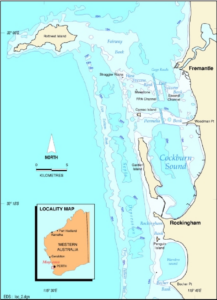The Government announced recently the proposed relocation of Perth’s container port from Fremantle to Kwinana and the adjoining Cockburn Sound has ignited a complex discourse, encompassing economic opportunities, environmental concerns, and a noteworthy proposal to redirect truck routes. As a resident living along the truck routes of Fremantle and Leach Highway, the proposed relocation of Fremantle Port to Kwinana Port is more than just a distant conversation; it’s a tangible and potentially transformative development in our community. Environmentalists have raised valid concerns about the potential impact on marine ecosystems, water and air quality, biodiversity, and climate change. During these discussions, it’s imperative to acknowledge the role of the Environmental Protection Authority (EPA) evaluation and the potential delays it may introduce. This article aims to provide an overview and analysis of the environmental criticisms, truck route redirection, and the potential delays associated with the EPA evaluation.

The proposed relocation to Cockburn raises concerns about its potential disruption to marine ecosystems. Dredging, a likely component of the expansion, poses risks to underwater habitats, emphasizing the need for careful consideration of the environmental impact on marine flora and fauna. (Recfishwest)
Water Quality and PollutionCockburn Sound supports valuable fisheries and aquatic resources. The potential disruption of fish populations due to changes in water quality and habitat loss poses direct challenges to the local fishing industries and the sustainable management of aquatic resources(Recfishwest). Critics emphasize the heightened risk of water pollution associated with dredging and increased port activities. The unique environmental conditions of Cockburn Sound demand heightened attention to water and sediment quality. The potential discharge of pollutants, increased sedimentation, and chemical runoff associated with the port expansion could pose severe threats to the sensitive marine life and habitats within Cockburn Sound. Efforts to address water quality concerns must be robust, considering the potential discharge of ballast water and the risk of oil spills in the waters surrounding Fremantle.
Air Quality and Noise Pollution
The surge in industrial activities, including shipping traffic and cargo handling, could contribute to air pollution and noise. These factors raise concerns about the well-being of nearby residents and the broader environmental impact, necessitating careful planning and mitigation measures. ( 2021)
Loss of Biodiversity
The intricate nature of Cockburn Sound’s ecosystem demands a meticulous examination of ecosystem modelling associated with the port expansion. The diversity of species, including marine life and bird populations, requires specific consideration in these models to accurately predict and mitigate potential impacts on this unique coastal environment (Recfishwest).Cockburn Sound is home to diverse benthic habitats crucial for various marine species. The expansion’s potential impact on these habitats, including seagrass beds and soft sediments, raises concerns about habitat disruption and loss. Preservation efforts must be heightened to maintain the delicate balance of Cockburn Sound’s marine ecosystems.
Hydrodynamic Modelling Tailored to Cockburn Sound
Hydrodynamic modelling specific to Cockburn Sound is critical for understanding the unique tidal and current patterns in this area. Inaccuracies in these models may lead to unforeseen consequences on sediment transport and circulation within Cockburn Sound, underscoring the need for precise modelling tailored to the local geography.
Coastal Processes and Shoreline Stability in Cockburn Sound
The alteration of coastal processes, including sediment transport and erosion patterns, directly impacts shoreline stability in Cockburn Sound. Recognising the vulnerability of this coastal area, strategies for minimising erosion and preserving valuable habitats must be a paramount consideration in the expansion plans. (Coastal Vulnerability in Cockburn)
Climate Change Considerations
With climate change a global priority, scrutinizing the carbon footprint of large-scale developments is essential. Critics argue that the increased industrial activity associated with the port expansion could contribute to greenhouse gas emissions, intensifying climate change concerns.
Impact on Traffic and Air Quality (Truck Route Removal)
The proposal to remove trucks from Fremantle and Leach Highway offers prospects for both improved air quality and reduced traffic congestion. This aligns with broader efforts to create a healthier urban environment, emphasizing the interconnectedness of economic growth and environmental sustainability.(Why Fremantle can’t handle the long term freight task alone)Rerouting trucks away from densely populated regions aims to reduce the overall noise footprint, contributing to a more peaceful atmosphere for residents along Fremantle and Leach Highway.The removal of trucks from busy urban roads can enhance overall road safety, aligning with broader efforts to create safer urban environments. Especially past the Fremantle Netball Courts, where traffic congestion is horrendous on Saturdays.
EPA Evaluation and Potential Delays
Adding a layer of complexity to the proposed expansion, the EPA evaluation process introduces the potential for delays. The thorough environmental assessment mandated by the EPA is critical, but stakeholders must be prepared for the possibility of extended timelines as the evaluation unfolds. (Industry worries EPA powers will cause further project delays)
Conclusion
In the midst of these discussions and uncertainties, it is crucial to recognize the personal impact of the proposed port relocation and the associated changes to truck routes. Balancing the potential for economic growth with the need to preserve the unique character of our community requires an empathetic understanding of the concerns shared by residents. As we collectively navigate this period of change, let us advocate for a transparent and community-centric approach that ensures our voices are heard and our neighbourhood remains a place we are proud to call home.
Collaboration, careful planning, and a commitment to responsible development are essential to ensure that the port relocation expansion aligns with broader goals, acknowledging and addressing the concerns of environmentalists and regulators alike.
Do you want to understand the EPA processes the developers of the new port face. Or for that matter any development in WA then attend LandTrack System’
Environmental Essentials course on the 21st and 22nd March.
